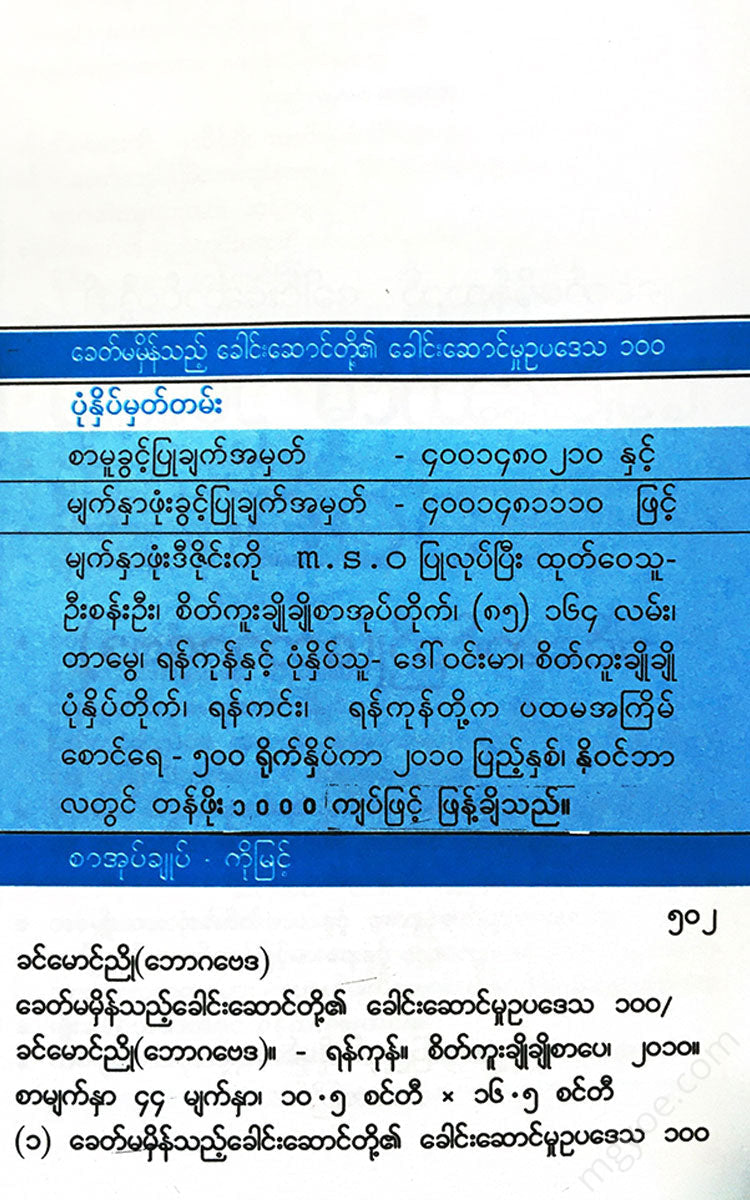စိတ်ကူးချိုချိုစာပေ
Khin Maung Nyo (Economics) - 100 Leadership Laws of Timeless Leaders
Khin Maung Nyo (Economics) - 100 Leadership Laws of Timeless Leaders
Couldn't load pickup availability
Introduction
Leadership is about intelligence, trustworthiness, humanity, courage, and discipline. Intelligence alone can lead to rebellion. Humanity alone can lead to weakness. Believing in one belief is foolish. Relying on courage alone can lead to violence. Too much discipline and precision in giving orders can lead to cruelty. Only when all five qualities are present and one fulfills his or her duties can one be a leader.
Sun Tzu
Sun Tzu's The Book of Military Strategy was originally intended to be read as a book of military strategy and philosophy. More than 2,000 years later, the qualities of a successful leader that Sun Tzu outlined are still relevant to military, political, economic, and any field that requires the emergence of group efforts toward a common goal.
Based on Sun Tzu's definition of leadership qualities, this book is divided into five sections, each containing twenty (20) propositions on the requirements for leadership from various perspectives. Careful readers may notice that some propositions seem to criticize propositions in other sections.
For example, in the chapter on trustworthiness, Douglas MacArthur says, “Do not give orders that cannot be obeyed,” and in the section on rules, Sophocles says, “Do not command that which cannot be obeyed.” Although the ideas are similar, Sophocles emphasizes the leader, while MacArthur emphasizes the follower. The common and contradictory statements, sometimes contradictory rules, are used to create a three-dimensional picture of a leader.
What kind of leader is a role model in theory? A role model leader has the intelligence to understand the subtleties and complexities of the leadership role. A leader cannot be a leader just by holding a position and holding the power of a leader. Leadership concepts are not fixed. Therefore, in society and in business organizations, we find various leaders and various types of leadership. A complete leader understands the concept of leadership and followership well.
A good leader understands the mutual responsibility between leader and follower. One side relies on the other and supports the other. A leader who is not humane is a leader only because of the power of a superior. Great leaders are motivated by virtue and principles, not by fear.
A good leader is also someone who is trustworthy. King Charles II of England was notoriously unreliable. Despite his cleverness, he is not considered a great leader in history. He trusted no one, and no one trusted him. Trust and credibility are essential for mutual dependence. If a leader loses the trust of his followers, they will not continue to follow his lead. They will only suffer bad results.
A successful leader is not only physically but also mentally courageous. He makes decisions alone, even when surrounded by many people to advise him. A successful leader takes responsibility for his own progress and failures, and accepts the consequences. If a leader does not have the courage to act on behalf of all, he will lose the trust of the people and eventually lose his position as a leader.
Finally, a good leader is a disciplined person. He teaches his followers to follow the right path. Discipline is not just about controlling and punishing those who do not follow. It includes guiding, positioning, and training. Without discipline, no one can lead effectively.
Sun Tzu said that the qualities he described as the foundation of leadership can be taken to extremes and misused. A leader is most effective when these qualities are used in balance. You can read and reflect on the quotes in this book and find your own path to leadership.
We would like to thank publisher Jamira and editor Rid Wolf for their assistance with this project.
Leslie Pockell
Adrienne Avila





